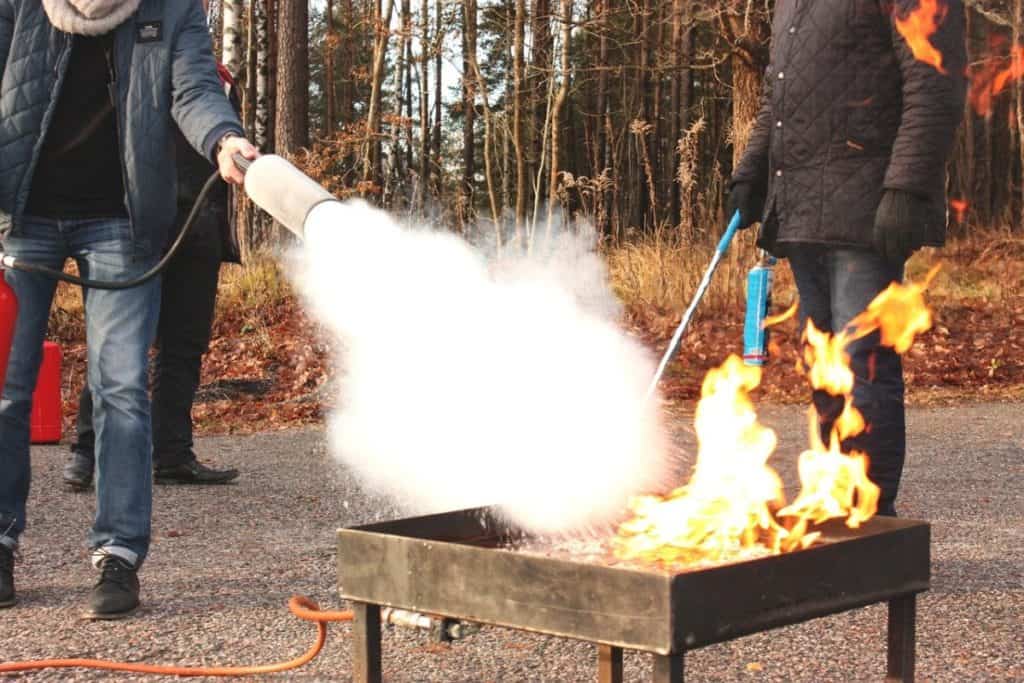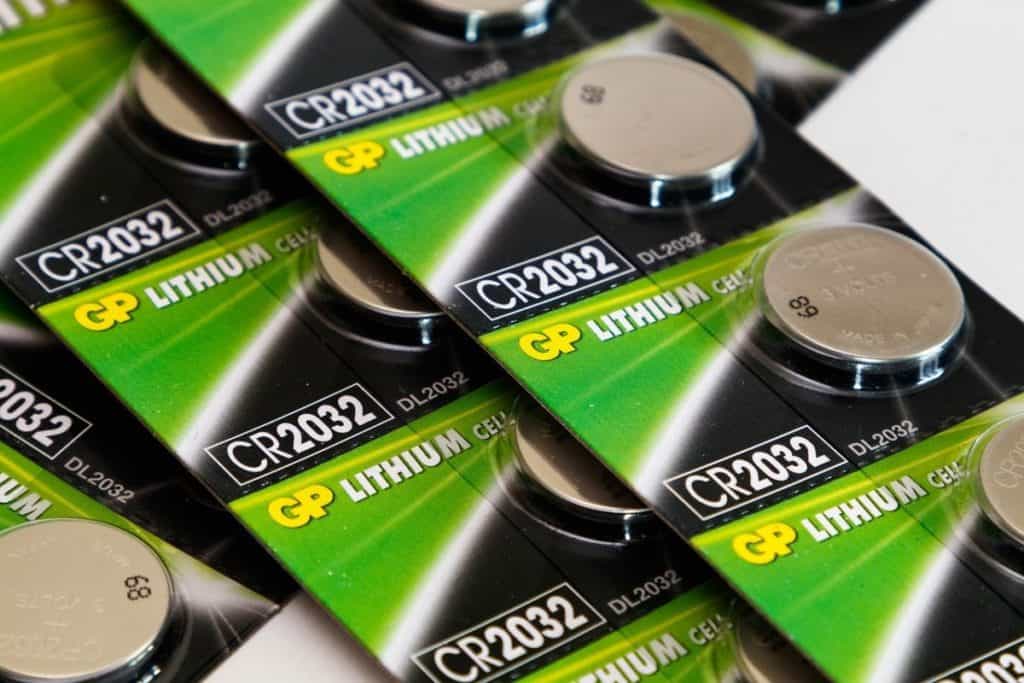If you use a lot of lithium-ion batteries at home or at the office, you might be wondering what the best type of fire extinguisher, in case they catch fire, is? Well, the answer to that is very straightforward as we’ll show you, though you need to make certain the batteries are lithium-ion and not just lithium, as the recommended extinguishers are different.
The best fire extinguisher for a lithium-ion battery fire is an ABC or BC extinguisher. However, a lithium battery fire needs a class-D dry powder extinguisher, certified for use in lithium fires. These types of batteries have very different hazards that require different extinguishers.
So, let’s take a look at lithium-ion batteries, why they catch fire, how to stop them from catching fire, and what to do if they do catch fire before we take a look at the same aspects of lithium batteries.
Your # 1 priority is keeping your family safe. As a firefighter, I recommend everyone has updated smoke detectors that don’t require battery changes, like these ones from Kidde, a fire extinguisher, like this one from Amerex, and a fire escape ladder if you have bedrooms above the first floor, I recommend this one from Hausse.
Also read: Storing a Fire Extinguisher: 5 Things to Keep in Mind
What are Lithium-Ion Batteries?
A lithium-ion battery uses a form of lithium polymer (that is a plastic) to deliver a fully rechargeable battery. The lithium ions in the battery are shifted from negative to positive while the battery discharges and they flow in the opposite direction when the battery is being recharged.
Here is video explaining how these batteries work:
Unlike a lithium battery, there is no lithium exposed in these batteries at any point and thus they must be handled quite differently to lithium batteries. The lithium-ion battery’s main fire hazard is the presence of a flammable electrolyte.
They are present in the majority of consumer electronics with rechargeable batteries such as smartphones, cameras, laptops, etc.
They were first conceived of in the 1970s but due to the cost and other safety concerns (the original batteries produced large quantities of pure hydrogen) they were shelves until the mid-1980s when Japanese researchers found a way to make lithium-ion batteries more cheaply and safely.
More than 1 billion lithium-ion batteries are produced each year around the world and they have a patchy track record when it comes to safety.
While it is true that the materials used to construct lithium-ion batteries can cause safety concerns, some batteries (such as those supplied by Samsung which spontaneously combusted and had to be recalled) meet all manufacturing standards and yet, still have issues.
Despite these concerns, the lithium-ion battery is here to stay. Its ubiquity and cost-effectiveness ensure that.
Also read: How To Put Out An Electrical (Class C) Fire: Firefighter Approved
What Can Cause Lithium-Ion Batteries to Catch Fire?
Lithium-ion batteries are particularly at risk when they become damaged as they are filled with a flammable electrolyte solution which could leak out of the battery and then meet with a source of spark or flame.
It is possible for a lithium-ion cell to be charged too quickly which can result in an internal short circuit that triggers a spark and then a fire or an explosion with the electrolyte.
Because these risks are well-known when it comes to lithium-ion batteries, the manufacturers are expected to use stringent testing to eliminate any problems and there are often restrictions on how many batteries of this nature may be shipped at any one time to prevent fires.
Despite this testing – there have been at least four very serious incidents on airliners which have been attributed to the lithium-ion batteries installed on the aircraft as well as several airline crashes that have been attributed to lithium-ion batteries in cargo.
They are also subject to what’s known as “energetic-failure” that is they suddenly release all of their stored energy at a single time which can force out gas from the electrolyte which is then combustible or explosive.
Failure to store lithium-ion batteries properly can also lead to fire risks (see below for how to store these batteries efficiently).
Finally, a failure to dispose of a faulty lithium-ion battery or one which has passed its expiration date can also lead to a fire risk.
Also read: Is Lithium Flammable? Battery Explosions
How Can You Store Lithium-Ion Batteries to Prevent Fire?
Storing lithium-ion batteries correctly in order to reduce the chances of fires is quite straightforward:
- Lithium-ion batteries should be stored between 40 and 80 degrees Fahrenheit. The occasional fall or rise in temperature above these endpoints is not likely to cause any fires, but repeated exposure to high or low temperatures is risky for these batteries.
- Lithium-ion batteries should be stored out of direct sunlight. Again, it’s easy for sunlight shining through glass (like a window) to pack much more heat than the day’s thermometer reading leads you to believe – it’s much better to keep batteries out of the sun for this reason.
- Lithium-ion batteries should never be charged without someone in attendance. It is a rare occurrence but if the battery fails during charging – it is possible that problems may develop. Early intervention can prevent overheating and fire.
- Lithium-ion batteries, as with all batteries, should be stored away from any other hazardous, explosive, flammable, or combustible material. This is to prevent the spread of fire and other problems if fires do arise.
Also read: Can Static Electricity Start A Fire?
Best Fire Extinguisher For Lithium-Ion Batteries
The best fire extinguisher for a lithium-ion battery fire is an ABC or BC chemical fire extinguisher.

Click here for current prices.
However, if there is neither to hand – you may also use a water extinguisher if necessary. Please make sure that the batteries are lithium-ion and not lithium in this instance – water on a lithium battery fire will result in a bigger fire.
Also read: Can Batteries Catch On Fire? Do They Ever Explode?
How to Extinguish a Lithium-Ion Battery Fire

The most important advice in fighting fires is that if you are not confident that it is safe to fight the fire by yourself or you have not been trained in the use of an extinguisher – you should call the fire department and allow them to handle it.
It is the fire department’s job to extinguish fires and if you do this job incorrectly, you can end up with a serious problem where the fire is either worsened or spread over a wider area. It is always better to be safe than sorry.
However, if you feel that it is safe for you to tackle the fire – you can use the extinguisher to spray the fire until it is extinguished.
Use the acronym P.A.S.S.
- Pull: Pull out the safety pin so they extinguisher can be used.
- Aim: Aim the nozzle at the base of the fire
- Squeeze: Squeeze the handle firmly
- Sweep: Sweep the nozzle back and forth across the base of the fire
If at any point, you feel that your approach is not working – you should stop and call for the fire department.
How to Dispose of Lithium-Ion Batteries Safely
Most lithium-ion batteries are recyclable and the best way to dispose of these batteries is to take them to a recycling facility. They are unlikely to pay for these batteries in small quantities but are often happy to pay for large quantities of commercially used lithium-ion batteries.
If you’re not aware of a local recycling company you can visit https://earth911.com and conduct a search by your area.
However, if there is no recycling company in your area and you live in the United States, it is considered safe to dispose of consumer quantities of these batteries in the municipal waste.
What are Lithium Batteries?

Lithium batteries are made using lithium metal as an anode in the battery cell. This is a soft, silvery-white metal that is part of the alkaline metals all of which are highly reactive. Lithium is incredibly light and the least dense (solid) metal in existence.
Lithium should always be kept away from flames because it is extremely flammable.
A lithium battery is designed to be single use and cannot be recharged. Typically, they produce voltages of around 1.5 volts to a maximum of around 3.7 volts.
You’ll find lithium batteries being used in many different consumer electronic devices and also in certain types of electric vehicles too. There are many different forms of lithium batteries and they do not all use the same reaction to drive the production of electric charge.
They tend to provide longer life than other cheaper alkaline battery cells though they do cost more to manufacture. They can’t readily replace zinc batteries, however, because the voltage they produce is substantially higher.
They account for about 28% of all batteries sold in Japan but in the EU they account for fewer than 0.5% of all battery sales. Thus, the likelihood of encountering lithium batteries is very much geographically dependent.
What Can Cause Lithium Batteries to Catch Fire?
One of the biggest problems with lithium batteries is that if they are short-circuited (e.g. there is a low-resistance bridge placed between the cathode and anode) they will discharge very quickly and, in turn, create a very large current.
Now, there are some applications when the ability to discharge a lithium battery might be useful, but in most cases, this can lead to the overheating of the battery. This is doubly true if there is cobalt present in the battery.
Overheating can lead to cell rupturing and even, exploding. Most consumer batteries include a special overcurrent vent to try and prevent explosions from taking place.
Water and liquids are also capable of interfering with the action of the cell and reacting violently with the lithium anode, as we said at the beginning, lithium is highly flammable and any exothermic reaction (such as mixing with water) can result in a fire.
Here is a video showing what happens when lithium is exposed to water:
It’s also possible to create a fire with a lithium battery by trying to recharge it. These batteries are not designed as rechargeable cells and forcing the reaction to run in reverse can thin out the walls of the cell – which leads to leakage and then fire.
Storing the batteries incorrectly (see details of how to store batteries safely below) can also result in the battery catching fire or exploding.
As you might expect, exposure to heat or naked flames can also result in the batteries exploding.
There are also concerns that lithium batteries might explode when the pressure is lowered and that means there are several airlines and airmail solutions that forbid the presence of lithium batteries. There are, however, no records of spontaneous combustion of properly carried batteries.
How Can You Store Lithium Batteries to Prevent Fire?
There are some fairly simple steps you can take to reduce the chances of a lithium battery catching fire in any circumstances:
- Don’t store them in direct sunlight. Quite often you can find that sunlight, particularly through glass, can end up much hotter than it first appears to be. Heat up a battery enough and it will explode.
- Keep them at between 40 and 80 degrees Fahrenheit. This isn’t to say that your batteries will explode at 81 degrees but they’re much less likely to cause you any real problems at this range of temperatures.
- Keep them away from water sources. Water and lithium do not mix well at all and it really is essential to keep the two apart.
- Keep them away from anything else that’s hazardous, combustible or flammable. The more you separate things that can catch fire, the more you minimize any potential damage that they may do if they do catch fire.
- Keep them in places that are not likely to see temperature spikes, open flames, or any kind of electrical sparking. This is good practice for all batteries of any description.
Best Fire Extinguisher for Lithium Batteries
The best fire extinguisher for lithium batteries is a class-D extinguisher that has been tested for use with lithium fires and certified as competent to tackle them. Here is an example of a Class D extinguisher.

A copper agent is often recommended as part of the chemical make up of the extinguishing material.
How to Extinguish a Lithium Battery Fire
You should never tackle any fire unless you feel competent and safe to do so. It is much better to leave fire fighting to professionals, otherwise. If you discover a lithium battery fire and don’t know how to use a fire extinguisher – call the fire department.
If you have had training in using an extinguisher and have a class-D lithium approved fire extinguisher to hand AND you feel it is safe to use it, you can use it to spray over the surface of the fire dispersing the powder evenly.
Again, use the acronym P.A.S.S.
- Pull: Pull out the safety pin so they extinguisher can be used.
- Aim: Aim the nozzle at the base of the fire
- Squeeze: Squeeze the handle firmly
- Sweep: Sweep the nozzle back and forth across the base of the fire
You must never use a water-based fire extinguisher on a lithium-battery fire, this will create an additional combustion reaction and make things worse, not better.
Always err on the side of safety, it is always better to seek help with fighting a fire than to get hurt tackling a blaze.
How to Dispose of Lithium Batteries Safely
It’s always important to consult with your local authority before disposing of any kind of battery. This is because the laws vary widely from place-to-place even within the United States. For example, in California, you might find a small button-sized lithium battery contains perchlorate (which is treated as a hazardous waste there) and it would need disposing of in a specific manner.
If there are no regulations in place, it’s normally safe to dispose of lithium cells in small quantities in municipal waste.
Conclusion
What’s the best fire extinguisher for lithium batteries? It’s a class-D powder extinguisher that has been properly certified for use with lithium fires.
What’s the best fire extinguisher for lithium-ion batteries? These require a Class ABC or BC dry chemical fire extinguisher.

